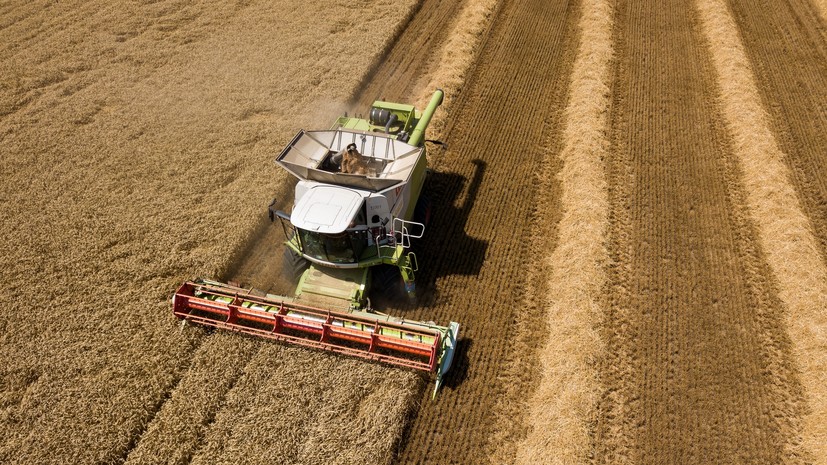In the 2020–2021 agricultural year (starting July 1), Russia is able to increase wheat deliveries abroad by 4.5% to 35 million tons. By this indicator, the country can significantly outperform other large exporters, such as the European Union (28.5 million tons), the USA (26 million) and Canada (24.5 million). Relevant data is contained in a report by the United States Department of Agriculture.
As noted in the department, in many respects the export leadership of Russia will be provided by record harvest volumes. American analysts predict that in the coming season, Russian farmers can harvest the maximum volume of wheat over the past three years - 77 million tons.
“Thanks to the new rich harvest, Russia will once again take the place of the world's leading wheat exporter. It is likely that in the first half of the agricultural year, the country's export prices will be competitive, and deliveries will go at a fast pace, which could potentially limit the market share of competitors from July to December, ”experts at the US Ministry of Agriculture emphasize.
A sharp increase in Russian wheat exports was already evident in early spring 2020. One of the reasons for the observed dynamics was the weakening of the ruble against the backdrop of a collapse in oil prices and the global coronavirus pandemic. About this in an interview with RT said the director of the analytical department of the Russian Grain Union (RZS) Elena Tyurina.
“The growth of world currencies in the spring of 2020 increased the competitiveness of Russian suppliers and gave them a price advantage. Farmers began to supply the product in large quantities abroad, which led to an increase in prices in the domestic market. To stabilize the situation, the Ministry of Agriculture of Russia suspended the export of grain outside the Eurasian Economic Union (EAEU). But these are temporary measures that will cease to be effective from July 1, 2020. As a result, in the 2020-2021 agricultural year, wheat exports may be above forecasts and reach 36 million tons, ”Tyurina said.
In part, the primacy of Russia among world wheat exporters may also become possible due to a decrease in European grain supplies. This point of view in a conversation with RT was voiced by the managing partner of Agro & Food Communications Ilya Bereznyuk.
“In the current agricultural year, the EU exports about 35 million tons of wheat. The expected decrease in supplies next year - by almost 6.5 million tons - will be associated with a reduction in sown areas, as well as difficult weather conditions in Western Europe, where crops in the fall suffered from rains, ”the expert explained.
It is noteworthy that the instability of weather conditions can to some extent affect the Russian wheat crop. So, earlier specialists of the Hydrometeorological Center of Russia reported that conditions for drought had formed in a number of regions of the country. About this writes TASS. However, according to Ilya Bereznyuk, the effect of climate change may be temporary.
“Now a lack of moisture is observed against the background of a fairly dry spring, but this is a temporary effect. Already in early summer, rains are forecasted, which will positively affect the harvest. Moreover, the abnormally warm and snowless winter did not allow the soil to freeze, so winter crops were not affected. As a result, the wheat crop following the results of the upcoming season may total 80–81 million tons, ”Bereznyuk noted.
As expected, a high wheat crop in Russia will help contain the rise in the cost of flour and bread. As a result, in 2020 the rise in prices for bakery products will not exceed the inflation rate. About this in an interview with RT told TeleTrade chief analyst Mark Goichmann.
“Against the background of a temporary suspension of grain exports outside the EAEU until July 1, the authorities managed to avoid a grain shortage inside the country. Moreover, prices will be supported by a record high level of wheat harvest. This will ensure a small increase in the cost of bakery products at the end of the year, which will not exceed inflation (within 4-5%) and may well be even lower than it, ”said Goikhman.
According to Ilya Bereznyuk, until the end of summer, the average increase in bread prices in Russia will not exceed 1-2%. Moreover, according to experts interviewed by RT, the actions of the country's Ministry of Agriculture have a positive impact on price dynamics.
In April, the agency began large-scale sales of grain in the domestic market from the state intervention fund. It is expected that the actions of the ministry should stabilize the cost of grain in the country. The agency artificially increases supply in the market and thereby helps to curb price increases.
“The Ministry of Agriculture, which since the middle of last month has sold more than 1 million tons of wheat from the state fund, also played a positive role. In other words, you should not worry about domestic prices, ”said Arseniy Dadashev, director of the Academy of Financial and Investment Management, to RT.

